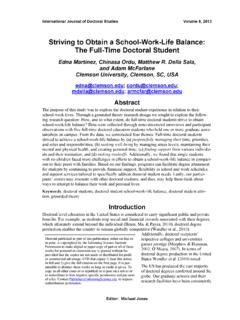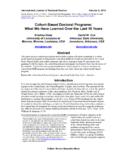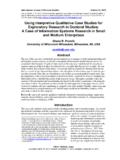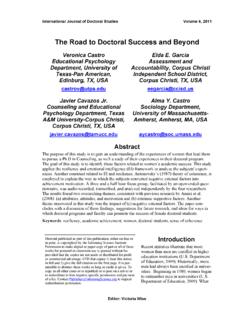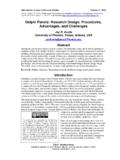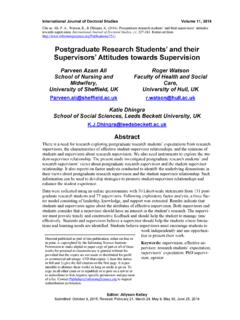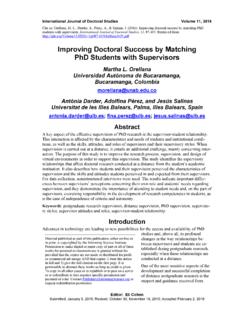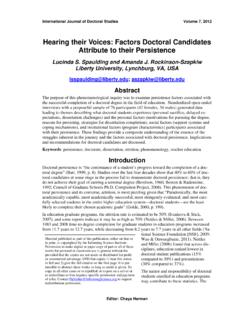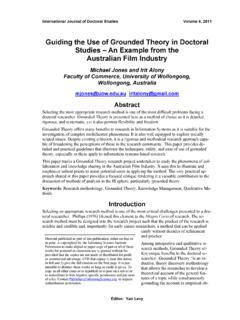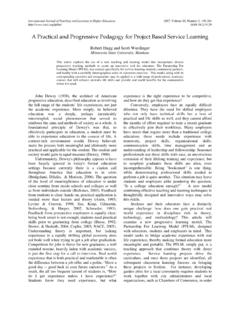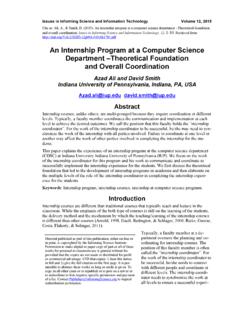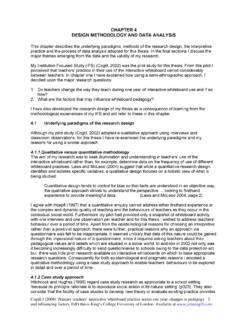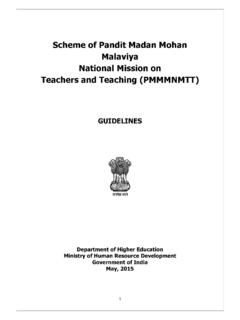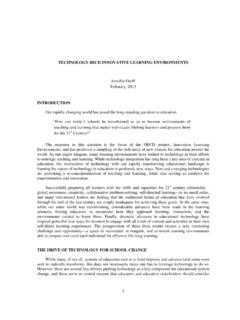Transcription of Supporting a Humanizing Pedagogy in the …
1 International Journal of Doctoral Studies Volume 9, 2014 Cite as: Khene, C. P. (2014). Supporting a Humanizing Pedagogy in the supervision relationship and process : A reflec-tion in a developing country. International Journal of Doctoral Studies, 9, 73-83. Retrieved from Editor: Simona Scarparo Supporting a Humanizing Pedagogy in the supervision relationship and process : A Reflection in a Developing Country Caroline Pade Khene Rhodes University, Grahamstown, South Africa Abstract Research supervision should be treated with as much significance as teaching at undergraduate levels.
2 Essentially, research supervisors are still dealing with students, about whom they have to be sensitive and aware, and the challenges they face in engaging with their doctoral study jour-ney. As supervisors, it is essential that we apply a Humanizing Pedagogy in the supervision rela-tionship to launch our students into becoming mature and capable researchers. The concept of a Humanizing Pedagogy is vital. In adopting this approach, the supervisor needs to become sensitive to the students they are supervising, and guide them towards a familiarity with the language of research and practical understanding of the skills of research within their discipline.
3 This is espe-cially vital in the South African and developing country context, as the students who enroll in these universities are often constrained by a number of factors, including their disadvantaged past and their cultural and social barriers. This paper presents a reflective discussion on an attempt to apply a Humanizing Pedagogy in the supervision relationship . Emerging academics who relate to this paper can use this reflection as an example to frame their own practice in applying a human-izing Pedagogy in supervision .
4 Keywords: Humanizing Pedagogy , collaboration, developing country, alienation, supervision relationship Introduction supervision can be seen as a form of teaching. I never really saw it that way and actually viewed it as a separate practice to the normal teaching we do in the classroom. However, I was wrong. One is actually teaching a student to become a researcher or scholar at different levels; that is, at master and doctorate level. At doctorate level, we teach students to surpass our own ability or knowledge as researchers, and teach them to discover their own niche as researchers within the discipline or, at times, across disci-plines.
5 The factors that I take into con-sideration when supervising a student are almost similar to what I would apply when teaching in the classroom. Friere (2005) defines a Humanizing Pedagogy as an approach where the teacher is a revolutionary leader in establishing a permanent relationship of dialogue with her/his students in an effort to build con-fidence in students who may be alienat-Material published as part of this publication, either on-line or in print, is copyrighted by the Informing Science Institute. Permission to make digital or paper copy of part or all of these works for personal or classroom use is granted without fee provided that the copies are not made or distributed for profit or commercial advantage AND that copies 1) bear this notice in full and 2) give the full citation on the first page.
6 It is per-missible to abstract these works so long as credit is given. To copy in all other cases or to republish or to post on a server or to redistribute to lists requires specific permission and payment of a fee. Contact to request redistribution permission. Supporting a Humanizing Pedagogy in the supervision relationship and process 74 ed or feel alienated from the process of supervision or research development. He describes it as a method that ceases to be an instrument by which the teachers (in this instance, the revolutionary leadership) can manipulate the students (in this instance, the oppressed), because it expresses the consciousness of the students themselves (Friere, 2005, p.)
7 69). A Humanizing Pedagogy , as I have come to understand, is an approach that attempts to be centred on the student; something that Biggs (1999) calls, a student-focused approach. Of course this does not mean that we as aca-demics succumb to believing the student is always right, and there is just something wrong with the way we supervise. Rather, a student-focused approach moves us away from a traditional teacher-focused approach of transmitting knowledge from expert supervisor to inexpert student, where the focus on strategies is on what the supervisor does.
8 Traditionally, the focus is on the procedures and rules of conduct for a supervisor to meet management criteria, regardless of the essential desired outcome, which is meant to be a good quality student with quality (not quantity) output. This is where the concept of a Humanizing Pedagogy is vital, where the conscientious su-pervisor actually needs to become sensitive to the student they are supervising, and guide them into conversing in the language of research and practicing the skill of research in the discipline (Northedge, 2003a).
9 I relate Humanizing Pedagogy in research supervision to now practicing supervision that is sensi-tive to what the student does (Biggs, 1999), where the supervisor guides the student into engag-ing in learning activities or tasks that support their learning process to become researchers. I have come to notice my students all struggle at the beginning of a research degree, mainly because of a fear of the unknown, but also a fear to develop and operate in a new learning environment. This has an influence on their confidence (feeling oppressed) in conducting research in the field, as well as their ability to write.
10 As a supervisor, I have seen my role as a facilitator in transforming the scholarly research identity of my students, so that they can realise their potential. Understand-ing their challenges, and how these result in self-exclusion and alienation, played a big role in determining how I relate to my students. The context I work in, that is, my university, which is located in a developing country, has a sig-nificant influence on how I supervise. This is an influence that academics from other developing countries may also relate to.
